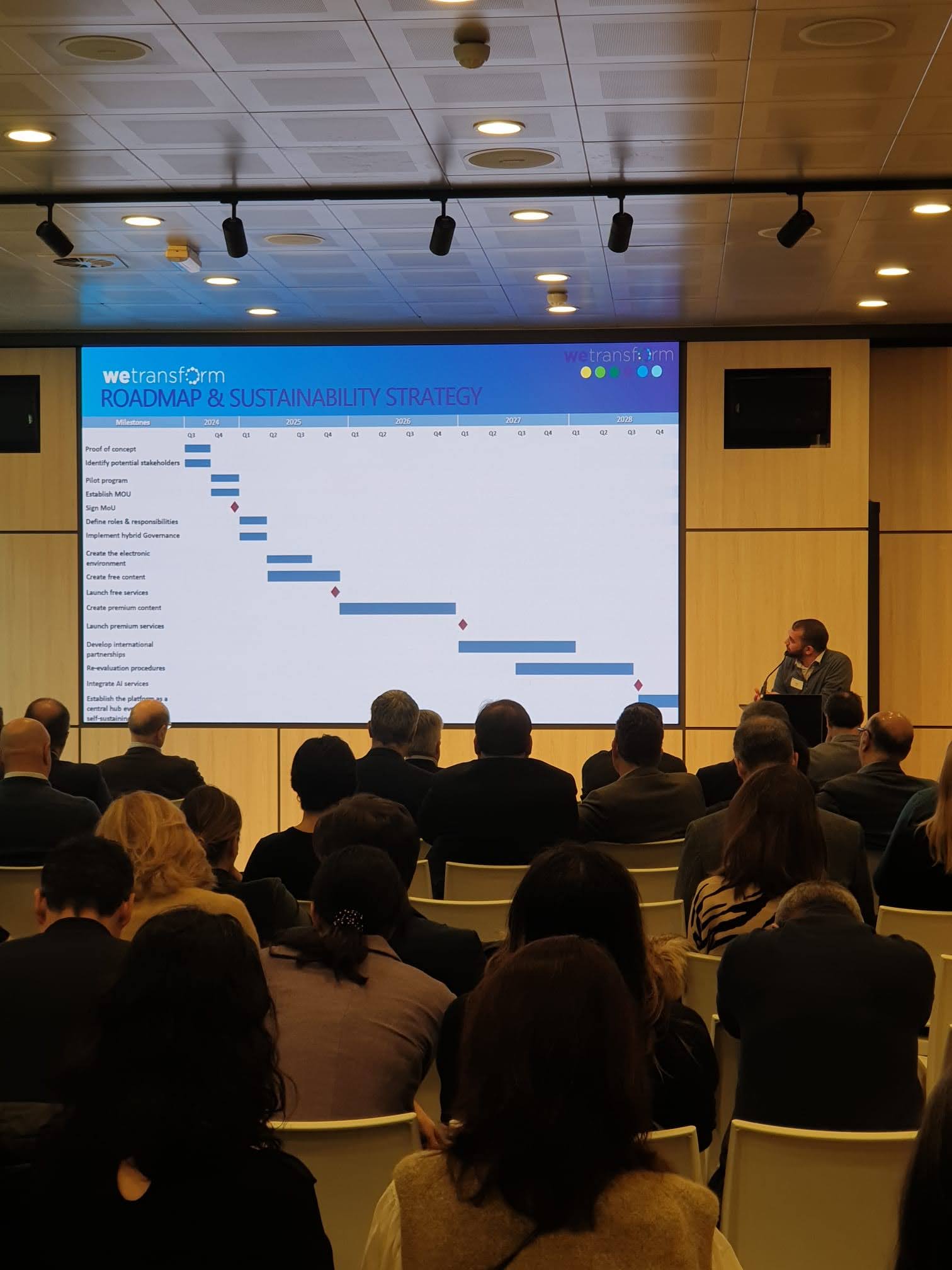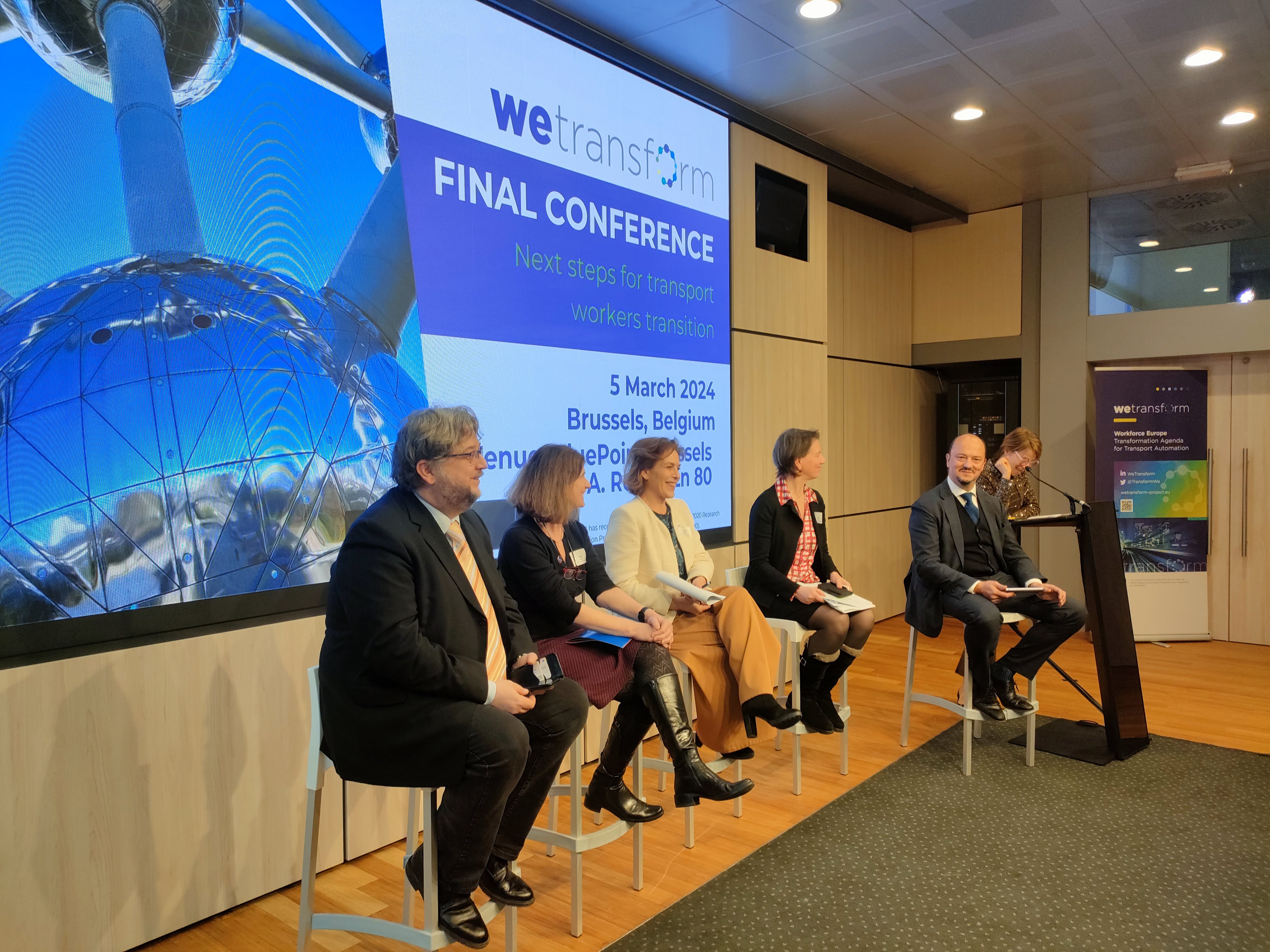Bridging Transport Technology and Labour: Recap of the WE-TRANSFORM Project's Final Conference
On March 5, the WE-TRANSFORM project’s final conference took place in Brussels. This meeting focused on the future of labour in the transportation sector, introducing an agenda for policy makers (and the European Commission in particular) to seamlessly integrate digital advancements with workforce development. The event, a beacon of collaboration and innovation, brought together over 150 attendees from all over the globe, embodying the project's global reach and impact.
Opening Remarks and Project Overview
The conference commenced with welcomes from the European Commission's project officer and Cristina Pronello, WE-TRANSFORM project coordinator. Cristina provided a comprehensive overview of the project's vision and policy agenda, which is meticulously segmented into four pivotal areas:
-
Public Governance and Regulation: Cristina outlined four policies under this area, emphasizing the importance of EU harmonisation and the need for structured budgeting on digitalisation and automation to ensure a balanced technological and human-centric workforce landscape.
-
Industrial Governance: She further delved into the sustainability of working conditions, highlighting the creation of a joint committee on working conditions and placing the worker at the centre of technological evolution within companies.
-
Training and Reskilling: The integrated policy presented aims to tackle the urgent need for upskilling, reskilling, and lifelong learning, addressing the fast-paced changes in the sector.
-
Minimisation of Workforce Exclusion and Exploitation: She underscored the critical policies designed to foster inclusivity and protect vulnerable groups within the workforce, including women, older workers, and workers with disabilities.

WE-TRANSFORM Community and Stakeholder Engagement
Julie Castermans, project manager at ERTICO, took the stage to showcase the WE-TRANSFORM community's formation and its engagement strategies. The project's commitment to co-creation was embodied in its extensive methodology including international workshops, thematic area groups, surveys, interviews, and multiple national focus groups, fostering a rich environment for dialogue and innovation, and gathering stakeholders from all parts of the transport ecosystem.

Innovative Business Model for Sustainable Knowledge Sharing
George Lameh from LGI Consulting presented the groundbreaking business model for the WET Living Hub. The proposed freemium model for the WE-TRANSFORM platform is set to ensure the longevity and accessibility of the project's outcomes, emphasizing the critical balance between revenue generation and cost management.

Keynote Speeches: A Deep Dive into Automation, Labor, and Upskilling
-
Jean-François Révah: Highlighting the reskilling of workers in the automation of metro systems, Révah stressed the significant benefits of automation when coupled with social transformation efforts, advocating for a human-centric approach in the transition towards automated public transport.
-
Matthew Daus: Daus provided insights into the U.S. perspective on automation and labor in transportation, emphasizing a market-driven approach that fosters innovation while addressing labour impacts and promoting workforce development.
-
Matteo Sgarzi: Focusing on upskilling and reskilling policies in France, Sgarzi shared valuable lessons from the national thematic review, pointing out the efforts to mobilize low-skilled adults and the challenges and opportunities in developing upskilling strategies within companies.
Roundtable with Local Administrations and Companies
This roundtable session fostered an insightful dialogue among experts who are directly shaping the future of transportation through their roles in human resources, research, air traffic control, advisory, and infrastructure development.
- Rozenn Boëdec, the recently appointed HR Director of the RATP Rail Services Business Unit, shared her vision on integrating digital transformation with human resource strategies to enhance workforce adaptability and motivation. Drawing from her extensive experience in metro and RER service activities, she emphasized the importance of employee engagement and well-being as key to navigating the challenges of automation and digitalization in public transportation.
- Adam Cohen, a US Senior Research Manager with a deep background in emerging transportation technologies, presented his perspective on the role of shared mobility, automated vehicles, and advanced air mobility in shaping sustainable urban ecosystems.
- Mirko Moschetti, an air traffic controller with expertise in international regulations and safety in technological evolution, highlighted the critical balance between advancing air transport technology and maintaining safety standards.
- Carlo Mearelli, CEO of THE ADVISORY LAB ITALY, discussed the importance of innovative business models and leadership in steering the transportation sector towards sustainable growth. Drawing on his 30 years of experience, Mearelli advocated for a new philosophy of business that prioritizes agility, stakeholder engagement, and environmental responsibility.
- Edwin Mermans, senior advisor international affairs at Province of Noord-Brabant, shared his experiences in fostering smart and green mobility initiatives. His work on the Trans-European Transport Network and Mobility as a Service highlighted the importance of multi-helix learning ecosystems and the role of governments in catalysing societal value through innovation. He stressed the importance in regional and local authorities to develop synergies among the different departmnents and agencies to develop policies that are able to tackle today’s challenges in the most effective way.

Roundtable with Political and Social Parties
The second roundtable session brought together influential figures from the European Parliament, the European Commission, and the European Transport Workers' Federation, to discuss the intersection of policy, labour rights, and the future of transportation.
- Daniela Rondinelli, a Member of the European Parliament, shared her insights from the EMPL and AGRI Committees, emphasizing the critical role of policy in shaping employment, social affairs, and sustainable development in the transportation sector. Rondinelli's contributions highlighted the necessity of legislative support for innovation and labour rights.
- Attila Benedek, representing the progressive alliance of Socialists and Democrats, underscored the importance of transport and tourism policies in achieving sustainable and inclusive growth. His perspective provided a glimpse into the policy frameworks that guide the European approach to transportation and environmental sustainability.
- Elisabeth Kotthaus, Head of Unit for Social Affairs, Passenger Rights & Equal Opportunities at DG MOVE, offered an in-depth look at the European Commission's efforts to ensure social fairness and accessibility in transportation. Kotthaus' experience in EU transport law and her advocacy for passenger rights underscored the pivotal role of regulatory frameworks in advancing social and technological progress during the last Commission mandate.
- Sabine Trier, Deputy General Secretary of the European Transport Workers' Federation, brought the perspective of labour advocacy to the table. Trier's discussion focused on protecting workers' rights amid the rapid technological changes and the increasing demand for reskilling and upskilling within the sector.

As the curtain falls on the WE-TRANSFORM project's final conference, it is clear that this landmark event has not only showcased the end of our research and collaborative efforts but has also set a new benchmark for future initiatives in the transportation sector. The project's action-oriented policy agenda, co-constructed and validated with an extensive network of stakeholders and workers, represents a blueprint designed to navigate the sector through the complex challenges and opportunities presented by automation and digital transformation.
This comprehensive Policy Agenda reflects a deep understanding of the nuances of public governance, industrial governance, training and reskilling, and the minimization of workforce exclusion and exploitation. By addressing these critical areas with targeted policies, the WE-TRANSFORM project has laid a solid foundation for a transition that is not only technologically advanced but also socially inclusive and economically sustainable.
The final conference has brought together voices from across the spectrum—local administrations, companies, political circles, social parties, industrial and economic players, and the workforce—to engage in a dialogue about the future of transportation. The insights shared and the discussions held underscore the collective resolve to ensure that the transition towards automation enhances the sector's resilience, efficiency, accessibility, and inclusivity.
The project's outcomes offer a roadmap for policymakers, industry leaders, and social advocates alike, equipping them with the knowledge and strategies to ensure that the transformation of the workforce is handled with foresight, compassion, and innovation. In doing so, the transportation sector can not only adapt to the automation transition but thrive in it, fostering a future where technology and human potential move forward, hand in hand.

